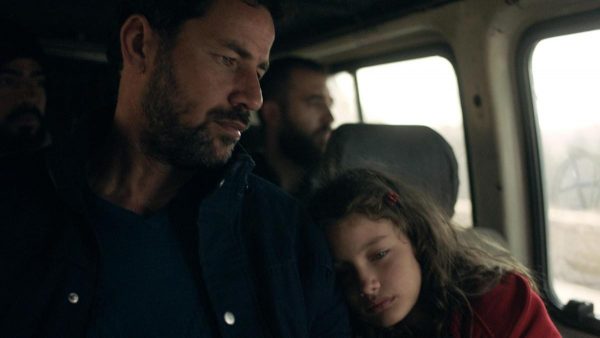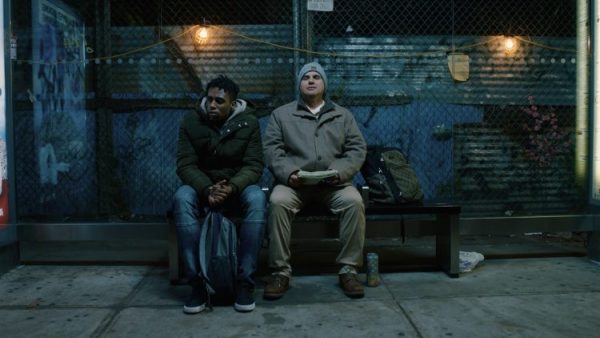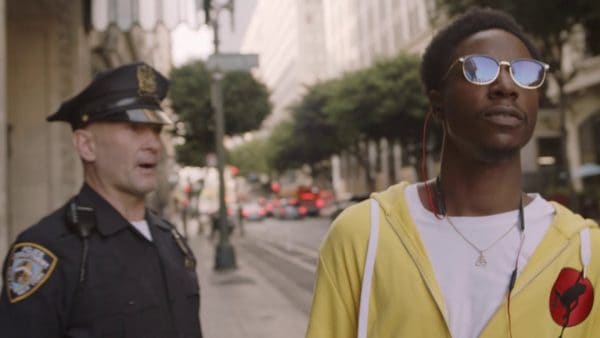Shaun Munro reviews 2021’s Oscar-nominated live-action short films…

We’re right on the eve of the 93rd Academy Awards, and in an attempt to foreground the typically under-discussed short film categories, this review series tackles each of the three fields – Animated, Live-Action, and Documentary.
True to form, this year’s batch of live-action nominees offer hard-hitting depictions of urgent social issues from around the globe, presenting an appealingly diverse array of subjects in the process.
Despite the potential for grimness, the deft tonal switch-footing from the filmmakers ensures a glint of hope emanates from the majority of the selections, most of which would be worthy winners on Oscar night.
5. The Letter Room

Written and directed by Oscar Isaac’s filmmaker wife Elvira Lind, The Letter Room follows a lonesome corrections officer, Richard (Isaac), as he undertakes his new assignment of screening letters sent to Death Row inmates.
Soon enough, an inmate asks Richard to break protocol and check whether letters from his estranged daughter have become lost in the shuffle, while Richard himself takes an extra-curricular interest in the letters sent by one woman, Rosita (Alia Shawkat), to her incarcerated partner.
This is almost solely the Oscar Isaac show – save for a brief cameo from Shawkat – and he brings a sure warmth to the lead role, even if having him rhetorically read some of the letters aloud for our benefit is a rather hokey – even lazy – affectation.
The intriguing setup, of a sad sack insinuating himself into the lives of prisoners, teases an intriguingly dark payoff, though ultimately abandons this in favour of something more disappointingly aloof and “harmless.”
All in all The Letter Room is a fine short, though it’s tough to ignore the nagging feeling it would’ve never made the Oscar slate without its A-lister involvement. Was this really more worthy of a nomination than Pedro Almodóvar’s The Human Voice?
Flickering Myth Rating – Film: ★ ★ ★ / Movie: ★ ★ ★
4. The Present

Farah Nabulsi’s BAFTA-winning short chronicles the arduous journey of Palestinian Yusef (Saleh Bakri) and his young daughter Yasmine (Maryam Kanj), as they venture to the city of Beitunia to acquire a gift – a refrigerator – for their wife and mother Noor (Mariam Kamel Basha).
What should be a simple excursion is massively complicated by obstructive Israeli soldiers at the checkpoints father and daughter are required to pass through in order to reach their destination. Forced to sit in a cage after expressing exasperation with the power-drunk soldiers, Yusef’s infuriatingly restricted movements make for a straight-forward yet powerful testament to the dehumanising potential of unchecked authority.
Bakri and Kanj deliver affectingly naturalistic performances which prove all the more shattering in their simple restraint. Moody cinematography and music further sell the turmoil, though some sound effects – particularly the checkpoint turnstile – are obviously post-produced to the point of comedy.
The Present is a compassionate, ever-welcome reminder of how even the most basic of activities can become Herculean tasks of perseverance for those less fortunate.
Flickering Myth Rating – Film: ★ ★ ★ ★ / Movie: ★ ★ ★
3. White Eye

Tomer Shushan’s technically show-stopping White Eye unfolds over a 21-minute unbroken take, as Israeli Omer (Daniel Gad) discovers his stolen bicycle on the street, only to learn that the new “owner,” an Eritrean immigrant by the name of Yunes (Dawit Tekelaeb), claims to have bought it unawares.
What initially seems to be a simple dramatic snapshot unfurls into something far more morally complex as Omer’s single-minded commitment to retrieving his bike presents a serious existential threat to Yunes, a refugee who has overstayed his visa.
Despite the potentially showy stylistic conceit, this is about as pared-down as “one-rs” get, but it is bracingly effective in conveying the minute-to-minute urgency of the fast-escalating scenario. At once a tantalising debate about the ethics of possession and a glimpse at the tricky calculus of value placed on “illegal” people, White Eye tells a provocative tale without feeling the need to hammer the point home with expository verbiage.
A disturbing late-film visual involving a freezer confirms the harrowing fear of the refugee experience, while the unexpected ending suggests that scenarios such as this – which pit regular folk against one another – offer no winners to speak of.
Flickering Myth Rating – Film: ★ ★ ★ ★ / Movie: ★ ★ ★
2. Feeling Through

Executive produced by Oscar-winning deaf actress Marlee Matlin (Children of a Lesser God), Doug Roland’s Feeling Through certainly touts the most outwardly sentimental potential of the five nominees, though also turns out the most crowd-pleasingly affecting.
In New York City, homeless Black teenager Tereek (Steven Prescod) is trying to lock down a bed for the night when he has a chance encounter with a deafblind man, Artie (Robert Tarango), who is simply trying to catch the bus, stop off at a bodega to quench his thirst, and make his way home.
Even if Roland’s film didn’t connect as strongly as it does, the casting of Tarango is significant, making him the first deafblind actor to star in a major film. But Feeling Through eschews a potentially facile through-line in favour of a genuinely affecting, expectation-defying depiction of a fast-forged bond between two men from very different life paths.
Roland’s simple, unfussed presentation gives actors Prescod and Tarango – both wonderfully naturalistic – the floor to offer a fascinating window into a world most viewers will know little about. Seeing Tereek work through the challenges of communicating with a deafblind man, and how to Artie this is simply the way his life is lived, makes for a shrewd juxtaposition of perspectives and forms a firm emotional anchor.
Feeling Through ditches its easy, tear-jerking potential in favour of an agreeably earnest tale of unexpected friendship – and landmark representation for the deafblind community.
Flickering Myth Rating – Film: ★ ★ ★ ★ / Movie: ★ ★ ★ ★
1. Two Distant Strangers

Travon Free and Martin Desmond Roe’s Two Distant Strangers is the only one of the five nominees not strictly tethered to reality, though it quite ingeniously uses a heightened premise to underline one of modern society’s most pressing issues.
Black New Yorker Carter (Joey Badass) finds himself caught in the most existentially defeating time loop ever when his day repeatedly ends as he’s murdered by a racist white police officer, Merk (Andrew Howard).
Though all the usual time loop movie touchstones are here – the signposted catastrophes the hero must learn to avoid, the song we’ll hear time and time again – employing the over-used gimmick to highlight the epidemic of blue-on-Black violence is nothing if not inspired.
If the potential for flippancy speaks for itself, it’s clear from Carter’s first death at the hands of Merk – a deeply upsetting sequence where Carter is suffocated while uttering “I can’t breathe” in his final moments – that the filmmakers have no desire to downplay real-world tragedy for breezy entertainment.
Despite its harrowing themes, there are some periodic chuckles to be found per Carter’s interactions with both his stunning one-night stand Perri (Zaria Simone) and Merk, all of which are accented by sharp editing and a wonderfully jazzy musical score from The Roots’ James Poyser.
Few would call Two Distant Strangers subtle, but it effectively collides a high concept with a timely subject to deeply disarming ends. As a concussive final sting, Free and Roe end the film with a list of Black murder victims at the hands of police, confirming that the loop of violence continues to persist despite the many great efforts of the Black Lives Matter movement.
Flickering Myth Rating – Film: ★ ★ ★ ★ / Movie: ★ ★ ★ ★
Shaun Munro – Follow me on Twitter for more film rambling.











